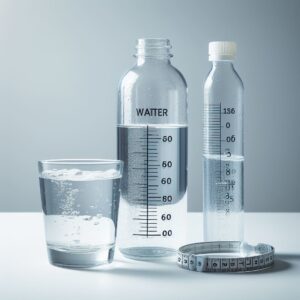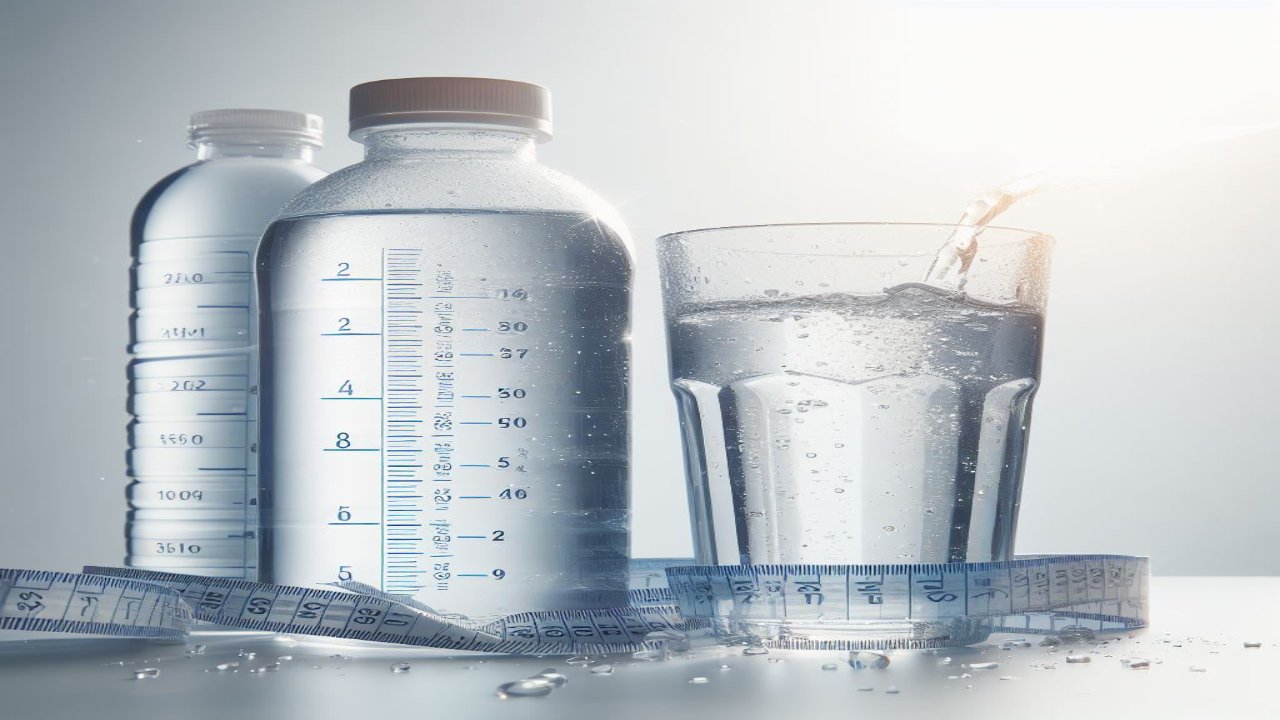Water is an essential component of our bodies, making up about 60% of our total body weight. We all know that staying hydrated is necessary, but do you ever wonder how much water you should drink daily? The answer may not be as straightforward as you think. Factors such as age, activity level, and climate can all affect our daily water needs. In this blog post, we will delve into the recommended daily water intake and why it is crucial for our overall health and well-being. So grab a glass of water, and let’s dive in!
Understanding the Importance of Water to Our Body
Water is not just a refreshing beverage; it is a vital element that our bodies rely on for survival. It plays a crucial role in maintaining our overall health and well-being. Water involves various bodily functions, such as digestion, absorption, circulation, and temperature regulation. Without enough water, these processes would not function properly, leading to various health issues.
One of the critical functions of water is hydration. When we consume water, it is absorbed by our bodies and distributed to our cells, tissues, and organs. This helps to replenish fluids lost through sweating, breathing, and digestion. Adequate hydration keeps our organs functioning optimally, helps regulate body temperature, and supports healthy digestion.
Water is also essential for proper nutrient absorption. It helps break down food and transport nutrients to our cells, allowing our bodies to benefit from the vitamins, minerals, and other essential compounds in our diet. Without enough water, our bodies may struggle to absorb these nutrients efficiently, leading to deficiencies and potential health problems.
In addition to supporting bodily functions, water is also crucial for maintaining healthy skin. Proper hydration keeps our skin cells plump and hydrated, which can help prevent dryness, dullness, and wrinkles. Staying hydrated can also improve the appearance of our skin, giving it a radiant and healthy glow.
Overall, water is the cornerstone of our health. Every cell, tissue, and organ in our bodies must function correctly. By understanding the importance of water and ensuring we drink enough each day, we can support our overall health and well-being. So grab that glass of water, and cheers to good health!
Determining the Recommended Daily Water Intake
Now that we understand the importance of water to our bodies, it’s time to tackle the big question: how much water should you drink each day? The recommended daily water intake can vary depending on several factors, including age, activity level, and climate.
A standard guideline is to drink at least 8 glasses of water daily, which equals about 64 ounces or 2 liters. However, this may not be enough for everyone. The National Academies of Sciences, Engineering, and Medicine provide more specific recommendations based on age and gender.
For adult men, the recommended daily water intake is about 3.7 liters or 125 ounces. This can be met through both beverages and foods that contain water. It’s important to note that individual needs may vary based on factors such as body size, activity level, and overall health.
For adult women, the recommended daily water intake is about 2.7 liters or 91 ounces. Pregnant women may require even more water to support their growing bodies and the needs of their developing babies.
Children and teens have their own recommended daily water intake guidelines. It’s essential to encourage them to drink water throughout the day to stay hydrated, especially during physical activity.
In addition to these general guidelines, it’s essential to listen to your body’s signals of thirst. If you feel thirsty, it’s a good indicator that you need to drink more water. It’s always better to err on the side of caution and ensure you are adequately hydrated.
Remember, these are general recommendations, and individual needs may vary. If you have any specific health conditions or concerns, it’s best to consult with a healthcare professional to determine your ideal daily water intake.
Stay tuned as we explore the various factors that can influence your daily water requirements and dive into the signs, symptoms, and consequences of dehydration.
Factors that Influence Your Daily Water Requirements
When determining your daily water intake, several factors can influence how much water you need to stay hydrated. These factors include age, activity level, climate, and overall health.
Age plays a significant role in determining your water needs. Infants and young children have higher water requirements due to rapid growth and higher metabolic rates. Older adults may also have increased water needs due to changes in kidney function and a decreased sense of thirst.
Your activity level is another vital factor to consider. If you lead an active lifestyle and engage in regular exercise or physical activity, you will likely need more water to replace the fluids lost through sweating. High-intensity exercise and hot weather can further increase your water requirements.
The climate you live in can also impact how much water you need to drink. Hot and humid environments can cause increased sweating and fluid loss, leading to higher water needs. Similarly, living at high altitudes or dry temperatures can increase water requirements.

Certain health conditions, such as kidney or bladder issues, can affect your water needs. In these cases, it is essential to work with a healthcare professional to determine your water requirements.
In addition to these factors, it is essential to listen to your body’s signals of thirst. Feeling thirsty is a clear sign that you need to drink more water. Other symptoms of dehydration include dark urine, dry mouth, fatigue, and dizziness.
By considering these factors and paying attention to your body’s signals, you can better determine your daily water requirements and ensure you stay adequately hydrated. Remember, everyone’s needs are different, so it’s essential to listen to your body and make adjustments as needed.
Dehydration: Signs, Symptoms and Consequences
Dehydration is a condition that occurs when your body loses more fluids than it takes in. It can happen to anyone, regardless of age or activity level. Recognizing the signs and symptoms of dehydration is crucial to preventing further complications and promoting overall health.
The signs of dehydration can vary depending on the severity of the condition. In mild cases, you may experience symptoms such as thirst, dry mouth, and dark urine. As dehydration progresses, you may notice additional symptoms like fatigue, dizziness, and lightheadedness. Severe dehydration can even lead to confusion, a rapid heartbeat, and fainting.
The consequences of dehydration can be significant. When your body lacks adequate fluids, it can impact your physical and mental well-being. Dehydration can impair cognitive function, affect mood, and decrease physical performance. In extreme cases, it can lead to heat exhaustion or heat stroke, which can be life-threatening.
Preventing dehydration is crucial. One of the best ways to avoid dehydration is to drink enough water throughout the day. Remember to listen to your body’s signals of thirst and drink water before you feel extremely thirsty. If you’re engaging in physical activity or spending time in hot weather, it’s essential to stay hydrated.
For healthy men
For healthy men, the recommended daily water intake is about 3.7 liters or 125 ounces. This may seem like a lot, but it is crucial to ensure that your body stays adequately hydrated. Water is essential for your overall health and well-being, and staying hydrated can have numerous benefits.
When you drink enough water, it helps your body maintain proper functioning. It supports your digestion, circulation, and temperature regulation, ensuring that all your bodily processes run smoothly. Adequate hydration also helps keep your organs functioning optimally and promotes healthy digestion.
Water is also crucial for nutrient absorption. It helps break down food and transport essential nutrients to your cells, allowing your body to benefit from the vitamins, minerals, and other compounds in your diet. Without enough water, your body may struggle to absorb these nutrients efficiently, leading to deficiencies and potential health problems.
Proper hydration also plays a role in maintaining healthy skin. When your skin is well-hydrated, it appears plump, radiant, and youthful. Staying adequately hydrated can help prevent dryness, dullness, and wrinkles, giving your skin a healthy glow.
Remember, these are general guidelines, and individual needs may vary based on factors such as body size, activity level, and overall health. It’s always best to listen to your body’s signals of thirst and drink water when needed. By making a conscious effort to stay hydrated, you can support your overall health and well-being. So grab that water bottle and keep sipping throughout the day!
For healthy women
For healthy women, the recommended daily water intake is about 2.7 liters, or 91 ounces. Staying hydrated is essential for women to maintain their overall health and well-being. Water plays a crucial role in various bodily functions, including digestion, circulation, and temperature regulation.
Proper hydration supports optimal organ function and helps maintain healthy digestion. Water also plays a crucial role in nutrient absorption, ensuring your body can benefit from the vitamins, minerals, and other compounds in your diet. By staying properly hydrated, you can avoid nutrient deficiencies and potential health issues.
In addition to supporting bodily functions, water is essential for healthy skin. Proper hydration keeps your skin cells plump and hydrated, helping to prevent dryness, dullness, and wrinkles. When you stay properly hydrated, your skin can have a radiant and healthy glow.
Remember that these are general guidelines, and individual water needs may vary. Body size, activity level, and overall health can influence your specific water requirements. It’s essential to listen to your body’s signals of thirst and drink water throughout the day to ensure you stay adequately hydrated.
So, ladies, grab that water bottle and make it a habit to sip water throughout the day. By staying properly hydrated, you can support your overall health and well-being and enjoy the benefits of a well-hydrated body and radiant skin. Cheers to good health!
Pregnant women
During pregnancy, your body goes through numerous changes, and staying hydrated becomes even more crucial. The recommended daily water intake for pregnant women is about 3 liters or 101 ounces. This may seem like a lot, but it is essential for supporting the health of both you and your growing baby.
Water plays a vital role in pregnancy. It helps to maintain amniotic fluid levels, which protect and cushion your baby. It also helps form the placenta, which delivers oxygen and nutrients to your baby. Additionally, water aids in the development of your baby’s cells, organs, and tissues.
Staying adequately hydrated during pregnancy can also help alleviate common discomforts such as constipation and swelling. It can help prevent urinary tract infections, which are more common during pregnancy. Adequate hydration is also essential for regulating your body temperature and supporting your overall well-being.
Remember, individual water needs may vary based on body size, activity level, and overall health. It’s essential to listen to your body’s signals of thirst and drink water throughout the day to ensure you stay adequately hydrated. If you have any concerns or specific health conditions, it’s always best to consult your healthcare provider for personalized recommendations.
So, pregnant ladies, make sure to carry a water bottle with you wherever you go and make staying hydrated a top priority. By keeping your water intake consistent, you can support a healthy pregnancy and give your baby the best possible start in life.
Children and teens
For children and teens, staying adequately hydrated is just as crucial as for adults. Children and teens may have even higher water requirements due to their active lifestyles and growing bodies.
During childhood and adolescence, kids are constantly on the move. They’re running, jumping, and playing, which means they’re losing fluids through sweat and breath at a faster rate. This makes it crucial for them to replenish those fluids and stay hydrated.
The recommended daily water intake for children and teens varies based on their age, size, and activity level. As a general guideline, kids aged 4–8 should aim for about 1.2 liters or 40 ounces of water daily. For kids aged 9–13, the recommended intake increases to about 1.8 liters, or 60 ounces. And for teens aged 14–18, it’s recommended to drink about 2.7 liters or 91 ounces of water daily.
Parents and caregivers must encourage children and teens to drink water daily. While juices and sodas may be appealing, they often contain added sugars and don’t provide the same hydrating benefits as water. By making water readily available and emphasizing its importance, parents can help instill healthy hydration habits in their children.
Additionally, children and teens must stay hydrated during physical activity. Whether playing sports or simply enjoying outdoor play, sweating can lead to dehydration if not adequately addressed. Please encourage them to drink water before, during, and after physical activity to replenish lost fluids and keep their bodies functioning optimally.
By promoting and prioritizing hydration in children and teens, we can help support their overall health and well-being. So let’s ensure they always have a water bottle nearby and encourage them to drink up throughout the day!
Staying Hydrated During Exercise
Staying hydrated during exercise is essential. When you engage in physical activity, whether a brisk walk, a challenging yoga session, or an intense workout, your body loses water through sweat. Sweating is the body’s natural way of regulating its temperature and cooling down, but it can also lead to dehydration if you don’t replenish the lost fluids.
When you exercise, it’s essential to drink water before, during, and after your workout to ensure you stay adequately hydrated. How much water you need will depend on the intensity and duration of your exercise, as well as factors like the temperature and humidity of your environment.
As a general guideline, aim to drink about 8 to 16 ounces of water 1 to 2 hours before your workout. During your exercise, drink about 7 to 10 ounces of water every 10 to 20 minutes, especially if you’re sweating heavily. After your workout, hydrate by drinking another 8 to 16 ounces of water within 30 minutes.
If you’re engaging in a particularly intense or long workout, or if you’re exercising in hot weather, you may need to drink more water to compensate for the increased fluid loss. Pay attention to your body’s signals of thirst and take breaks to rehydrate as needed.
In addition to water, sports drinks can be beneficial during prolonged or intense exercise as they can provide electrolytes and carbohydrates to help fuel your muscles and replace lost nutrients. However, be mindful of the added sugars in some sports drinks and opt for healthier options if possible.
Staying hydrated during exercise will not only help prevent dehydration, but it can also improve your performance and reduce the risk of fatigue and muscle cramps. So, don’t forget to bring that water bottle with you and prioritize hydration during your workouts. Your body will thank you!
Conclusions
After delving into the recommended daily water intake and understanding the importance of water to our bodies, it is clear that staying hydrated is crucial for our overall health and well-being. Water involves various bodily functions, including digestion, absorption, circulation, and temperature regulation. It helps replenish fluids lost through sweating, breathing, and digestion, keeping our organs functioning optimally and supporting healthy digestion.
Proper hydration is not only essential for bodily functions, but it also plays a role in nutrient absorption and maintaining healthy skin. By drinking enough water, we can ensure our bodies efficiently absorb the vitamins, minerals, and other essential compounds in our diet. Hydrated skin appears plump, radiant, and youthful, while staying hydrated can help prevent dryness, dullness, and wrinkles.
Determining the recommended daily water intake can vary depending on factors such as age, activity level, and climate. While the general guideline is to drink at least 8 glasses of water daily, individual needs may vary. Listening to your body’s signals of thirst and paying attention to factors like sweating, physical activity, and the climate you live in can help determine your specific water requirements.
Dehydration is a condition that should be avoided at all costs. It can lead to various health complications, including impaired cognitive function, mood changes, decreased physical performance, and even life-threatening conditions like heat stroke. Preventing dehydration is as simple as drinking enough water throughout the day and listening to your body’s signals of thirst.
In conclusion, staying adequately hydrated by drinking an adequate amount of water each day is crucial for our overall health and well-being. By understanding the importance of water, determining our individual water needs, and preventing dehydration, we can support our body’s functions, maintain healthy skin, and enjoy the numerous benefits of being adequately hydrated. So remember, grab that water bottle and keep sipping throughout the day to cheer for good health!

